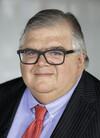The banks' bank is looking to open up
Translation of an interview with Mr Agustín Carstens, General Manager of the BIS, in the Basler Zeitung, 25 June 2018.
Head of the BIS Agustín Carstens in an interview about Basel as the focal point of monetary authorities
by Christian Egli and Christoph Hirter
The "Tower of Basel" is the head office of the Bank for International Settlements (BIS) and regular meeting place of the most powerful central bankers in the world: Mario Draghi, Jerome Powell and Thomas Jordan are regular visitors. But hardly anything of what goes on in the 19-storey building is known to the general public.
But all that is now set to change. "We want to become more approachable," says General Manager Agustín Carstens in an exclusive interview with the Basler Zeitung. "In two years' time, we will be celebrating the 90th anniversary of the BIS. We want to use the occasion to better explain what we do here and how important our activities are." As to the reasons for opening up, Carstens says, "Central banks have in general become more transparent. We should reflect that trend and in turn become a more open and more transparent organisation."
Monetary pole star
The BIS was founded in 1930 with one mandate: processing German reparation payments after the First World War. To avoid the military powers Germany and France clashing over the issue, the venue chosen was in neutral Switzerland - Basel. Today the BIS performs a completely different set of duties. As "the central banks' bank", it administers the foreign exchange reserves of its member banks. In addition, central bank heads meet here every two months to discuss urgent foreign exchange and financial stability matters. And international renown has been gained by Basel III, the set of banking regulatory rules put together after the financial crisis.
This transparency offensive is also likely a reflection of the character of Agustín Carstens. The Mexican, who studied in Chicago, has been at the head of the BIS since December 2017. The 60-year-old economist is the first BIS General Manager to come from an emerging market economy. In his role, he says, nationality is set aside, but his experience in dealing with all kinds of crises is certainly a plus.
Central bankers from all over the world consider Carstens a brilliant economist. Seven years ago, he came close to becoming the Managing Director of the International Monetary Fund (IMF), but lost out to France's Christine Lagarde. "On the strength of her abilities, she deserved the appointment," says Carstens in the interview.

